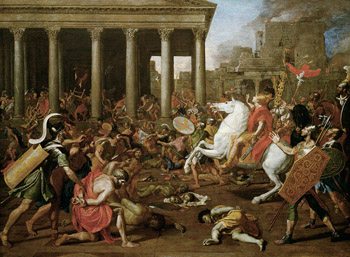
Of all the great problems of European Civilization that historians and commentators of current complexities like to study for similarities and possible solutions, few if any ranks as more important than the “Decline and Fall of the Roman Empire.” It went from its greatest territorial expansion under the emperor Trajan at the beginning of the second century A.D. to a complete military disintegration in the West within 350 years. Since subsequent empires and other powerful nation-states have fared little better, a study of the Roman decline and their modern corollaries deserves some scrutiny.
However, the end of the Western Empire occurred not as the barbarians began to pour through the frontier defenses, but at least a century earlier when softness and decay attacked the entire social fabric. Although, many historians list economic and political causes in Rome’s collapse, other factors also suggest a moral decay that ate away the foundations of social and family life.
The upper and more influential classes were principally occupied in acquiring wealth and luxury in order to spend their days in rounds of pleasure, ease and comfort. Literature and learning were ignored. This group, once the field of recruitment, was no longer fit for military service or civic leadership. It is certainly not necessary to catalogue the prevalent vices of the day in any detail. The quest for selfish immorality never ceased from the time of Christ to the military collapse. Saint Paul in his epistles complained that the people had delivered themselves up to impurity so as to perpetuate all kinds of uncleanness.
1. Adrianople and Benghazi: Something Very Wrong
Adrianople
Late in the fourth century in Thrace (modern Bulgaria), the Danube River separated Roman Civilization from the barbarian turmoil to the northeast. The lands of the latter were greatly agitated by an invasion of hordes of wild Asiatic Huns who pushed the less rapacious Goths up against the Danube. In order to find space to live and raise their families, the Goths sought and received permission from the Romans to cross over and settle in their territory, providing they supplied some warriors for the Roman army.
Unfortunately, the greed and extortion of the Roman commissioners provoked an uprising and the Goths went on a rampage of plunder throughout the Balkans.  Then Valens, the Western Roman emperor, did what the Romans had been doing for centuries with their superior numbers and fighting power. In 378 he put together what he considered a sufficient fighting force and without any reconnaissance attacked the Goths who were camped outside the walled town of Adrianople. The Goths crushed the Romans with a vigorous cavalry attack, killing the emperor along with two-thirds of his army. Although the crisis quieted down to some extent, the disaster marked a major break in the history of the Empire, for the Romans were incapable of avenging the defeat, nor could they move the Goths out. To locate the actual problems presents some difficulty, but one thing is certain, something went very, very wrong!
Then Valens, the Western Roman emperor, did what the Romans had been doing for centuries with their superior numbers and fighting power. In 378 he put together what he considered a sufficient fighting force and without any reconnaissance attacked the Goths who were camped outside the walled town of Adrianople. The Goths crushed the Romans with a vigorous cavalry attack, killing the emperor along with two-thirds of his army. Although the crisis quieted down to some extent, the disaster marked a major break in the history of the Empire, for the Romans were incapable of avenging the defeat, nor could they move the Goths out. To locate the actual problems presents some difficulty, but one thing is certain, something went very, very wrong!
September 11, 2001
On September 11, 2001 at approximately 8:00 A.M. two flights left Boston’s Logan Airport about two minutes apart, bound for Los Angeles. But neither got very far West, for they had been hijacked by Muslim terrorists who had another destination in mind. They intended to demolish the two towers at he World Trade Center, both 110 stories high, the tallest in the world when built in the 1970s. Both planes smashed into the towers at the upper floors causing thousands of gallons of jet fuel to ignite. Huge bellowing flames erupted that melted the inner core and brought the huge towers and their workers to the ground in horrible mangled heap of steel and corpses. Nothing can rival the revulsion of viewing photographs of terrified human beings on the top floors just moments before the collapse.

A third passenger plane that took off from Dulles Airport turned around, came back and blasted a huge whole in the Pentagon, the nation’s military headquarters, killing about a hundred. A fourth plane that seemed to be headed for either the White house or the U.S. Capitol was retaken by the passengers in western Pennsylvania and deliberately destroyed by the terrorist-pilot, killing all aboard.
Thus began another phase in the centuries-old Muslim jihad, this time against symbols of American commercial and military superiority. In retaliation, President Bush inaugurated a global war on terrorism, which resulted in the removal of the Taliban from Afghanistan and of Saddam Hussein from Iraq.
Benghazi
Libya has been a flashpoint for theU.S., an occasion for confrontations in the Near East for decades, and also a battleground for either a muscular foreign policy or a wimpish retreat. In the 1980s Moammar Gadhafi was sending hit squads into Europe to knock off exposed American soldiers. After one such attack, President Reagan launched 30 U.S. warplanes to hammer targets in Tripoli and Benghazi which resulted in a death and injuries to Gadhafi’s family. That ended Gadhafi’s terrorism and shows the salutary effect of resolve and toughness.
Unfortunately, that sturdy defense has been lacking in recent years. After Gadhafi was overthrown, Christopher Stevens was appointed ambassador to the al Qaeda jihadists who replaced the Libyan dictator. On the 2012 anniversary of 9/11, Stevens went to Benghazi where he, an aide, and two security officers were brazenly murdered in a well-organized attack. The Obama administration’s weak and devious response has been acutely investigated by the conservative press.
For days afterward, Obama officials claimed the Benghazi disaster was a response to a short, second-rate video that had been kicking around for weeks, but slowly the truth emerged, along with several implications. Admiral James Lyons (ret.) reported in his column in early November (11/2/12) that several security agencies (CIA etc.) were monitoring the assault on their reconnaissance equipment but did nothing to answer repeated calls for assistance. He also stated that Stevens was there to facilitate the transfer of heavy arms to al Qaeda-affiliated groups fighting Syria. He further reported that the so-called Consulate was located in two large warehouses. Adm. Lyons also noted that we had more than sufficient military resources within striking distance, but they remained curiously inactive. Frank Gaffney, another well-known columnist, in an earlier article verified most of this disturbing information. Both columns appeared in The Washington Times.
Other newsmen—some from the Wall Street Journal—tell a story of inadequate security, improper leadership and connivance with Moslem terrorists groups. In this tale of abysmal confusion, much remains to be learned, but one thing is certain: something went very, very wrong.
2. Sack of Rome and Boston Bombing: Something Very Wrong
Sack of Rome (410)
After the humiliating defeat at Adrianople, the Roman imperial leadership denigrated into gross incompetence. When Theodosius, the last competent emperor of the united Roman world, died (395), he divided the Empire between his two sons; one imbecilic and the other useless. His great friend and advisor, Saint Ambrose, died two and a half months later leaving a great void at the top.
While the political structure began to crumble at the top, control of events descended to secondary officials more interested in intrigue than honorable leadership. Alaric, an exceptional young man who trained in a Roman military school, rose to power among the Goths. Tired of all the political bickering, he moved his military contingent from the East into Italy and became more of a freebooter than a reliable Roman confederate.
After failed negotiations with the emperor who had barricaded himself in his city of Ravenna, surrounded by impenetrable swamplands, Alaric entered Rome in August, 410. For three days he ravaged what had been the capital of the civilized world. Curiously, the barbarian general, himself an Arian, gave orders to spare the Christian churches and clergy. Others were not so lucky.
Saint Jerome lamented from Bethlehem, “My voice fails, choked with sobbing….When Rome falls, the world falls.” Saint Augustine saw it differently; in the City of God, he explained that all the actions fulfilled the word of God, and we must extract from them the necessity of following His law, which had been sorely neglected.
Muslim Terrorism in Boston
Opponents of the concept of tradition can see a lot to dislike in the Boston Marathon. The race itself dates back to 490B.C. when a Greek soldier ran over 25 miles from the Plain of Marathon to Athens to announce a pivotal victory of the Greeks over the Persians. The best-known and oldest annual race that commemorates that event began in Boston in 1897.
Boston itself also enjoys a long, rich heritage. Captain John Smith came ashore north of Boston in 1614 and the Mayflower landed a similar distance to the south in 1620. In between, a group of merchants, farmers and seamen developed a large colonial community stretching for miles inland and along the coast that prided itself on its cultural and intellectual excellence in contrast to its neighbors to the south that favored industry and finance. In short Boston and its lengthy suburbs has enjoyed a more relaxed and less frenetic lifestyle. All that came crashing down on April 15.
The fabled run ends in the Back Bay section of Boston amid several viewing stands, a couple of blocks west of old Copley Square and the large ornate public library. Two Muslim brothers, born in Chechnya, had placed two pressure cooker bombs in the area, designed to cause maximum damage to the lower half of the body. They went off around three o’clock after several runners had crossed the finish line. The carnage was devastating.
The injuries resembled those found typically on the battlefield. At least thirteen people lost limbs; two patients lost both. Ten youngsters were admitted to Boston Children’s Hospital. Quick-acting responders saved several of their lives by applying tourniquets. With three deaths and over 175 injured, Boston joins New York City and Washington D.C, in a lengthening list of victim-cities of fanatical terrorism.
The Tsarnaev Brothers
Surveillance photos identified the Chechen bombers as Tamerlin Tsarnaev, 26 and his younger brother, Dzhokhor, 19, residents of nearby Cambridge. But the  brothers struck before they could be apprehended. On Thursday night (April 18) they shot and killed a campus policeman at MIT, carjacked a Mercedes and shot a transit cop who survived. Around midnight police caught up to the terrorists in Watertown a few miles away where they killed Tamerlin in a wild gun battle, but the younger brother evaded them for another eighteen hours. A mammoth dragnet finally located him, full of bullet holes, hiding in a covered boat in a backyard.
brothers struck before they could be apprehended. On Thursday night (April 18) they shot and killed a campus policeman at MIT, carjacked a Mercedes and shot a transit cop who survived. Around midnight police caught up to the terrorists in Watertown a few miles away where they killed Tamerlin in a wild gun battle, but the younger brother evaded them for another eighteen hours. A mammoth dragnet finally located him, full of bullet holes, hiding in a covered boat in a backyard.
The younger Tsarnaev arrived in the United States with his parents in 2002; the older brother on his own in 2004. The latter never seemed comfortable in this country for any length of time and slowly along with his mother reverted back to Islamist culture. During this time he attracted the attention of the FBI. In January 2012, Tamerlin flew to Moscow, traveled to Dagestan, another Russian province with simmering Islamist insurgency, and left Moscow for the U. S. in July. Somewhere along the line, he became a terrorist and recruited his younger brother who indicated at the time of his arrest that he was motivated by Muslim anger at the U. S. For the sake of brevity, some more damaging elements of intrigue have been omitted and others simplified, but one thing is certain: something has gone very, very wrong.
One Final Note
When two Catholic priests heard the blasts on that April afternoon, they reached for their sick call kit and rushed to the scene, but were denied access to the victims by the police. One of the three deaths at the scene of devastation was an 8-year-old boy, a Catholic, who died a few feet from one of the priests who had with him the holy oils of Extreme Unction to assist the stricken boy into the entrance of the Divine Presence. The irony is that this occurred in one of few American cities that have a majority Catholic population. On that April day, Muslim terrorists did what they do best, but two priests were prevented from fulfilling their critical role. Yes, something is very, very wrong!
